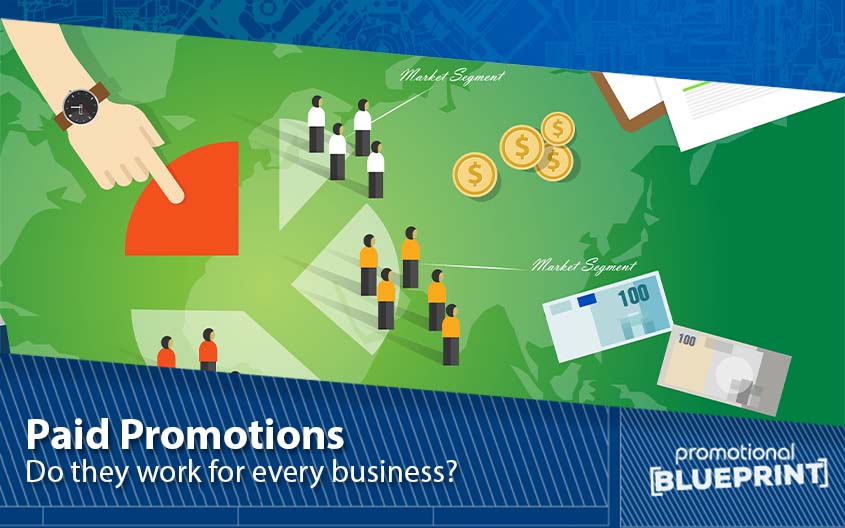
When it comes to advertising, there is no shortage of strategies companies employ to stand out in a highly competitive market. Giveaways, eye-catching advertisements, and in recent years, paid promotions are just some of the methods companies use to reach new customers. Out of all of these options, paid promos are the most interesting.
By definition, paid promotions involve a brand acquiring a media space where they can place their content. Many claim this form of advertising is highly beneficial for two reasons. First, it enables a brand to take advantage of a popular medium, like movies, videos, podcasts, and more, to raise brand awareness. Second, it allows brands to focus on a specific target audience or segment.
However, is this really true? While this form of advertising looks nice on paper, it can cost a pretty penny. Plus, there’s a real possibility it won’t work for every business type and their goals. Therefore, many brands struggle to determine whether paid promotions are worth it or not.
Fortunately, there is a way to resolve these doubts. Companies can more easily determine how paid promotions will impact their business goals by examining what a brand wants to achieve with its promo campaign.
Paid Promotions 101
Anyone with a working telly has come across bits of paid promotion. Companies have been using TV to raise brand awareness for ages, be it an ad break or sponsorship segment on a talk show. With the rise of the internet and influencer culture, brands have capitalised on popular online personalities to get them to promote their products to a completely new audience.
This approach has proven very successful. Recent studies show that around 48% of the world’s population has some kind of social media presence. However, people don’t just use their Facebook, Instagram, and Twitter profiles to follow their friends and family. They also follow various content creators and buy a lot of products online.
Influencers play an especially important role in impacting their fans’ purchasing habits. People consider the influencers they follow as trustworthy sources of information. Therefore, it’s not surprising that young people, especially Gen Z, are more likely to follow their recommendations when it comes to businesses they should buy from.
In fact, around 79% of users engaged with a brand an influencer recommended, some 67% visited the brand’s website, and 47% actually purchased a product. That is quite a significant rise in revenue, especially if a brand is trying to build a customer base.
Other forms of paid promotions include Instagram ads, custom hashtags, and product placements. While these methods don’t directly call the audience to buy from a brand, they subconsciously implant the brand inside their minds.
A colourful ad on a consumer’s ‘for you’ feed can drive their interest and get them to click on the ad to check out the company. This both drives engagement and potentially increases revenue as customers become more and more familiar with the brand.
Is It Worth It to Use Paid Promotions?
In summary, paid promotions are a worthwhile investment for brands looking to increase their traction. However, are they suitable for every company? Marketing isn’t a one-shoe-fits-all, and what works for one brand may not work for another.
So, companies wondering if paid promotions are worth it should first consider what they’re trying to achieve with their advertisement.
1. The Target Audience
The whole point of a marketing campaign is to reach the right audience. Depending on their age, gender, and profession, different demographics will respond better to different kinds of marketing.
For example, Baby boomers are more appreciative of old-school marketing tactics. So, paid promotional segments on a morning talk show or an ad in the paper will be a good way to reach them.
On the other hand, Millennials and Gen Z don’t want flashy gimmicks from their advertisements — they want meaningful action. The recent environmental crisis has made the youth more mindful of their purchasing habits. Ethics and sustainability play a big role in determining which brand they will do business with. A lot of companies have tried to capitalise on their activism by centring marketing campaigns around raising awareness about important social issues.
However, just raising awareness isn’t enough for Gen Z. They want a business to prove it’s actually taking meaningful action to resolve these problems before giving them their business. Consequently, before a company can decide if it will use paid promos to market to Gen Z, it first needs to evaluate its values and business practices.
2. The Competition
Another factor influencing what kind of promotional strategy a brand chooses is the competition. Advertising, especially advertising online, is hypercompetitive. There is an enormous number of brands bombarding customers with ads to get their attention. In this oversaturated climate, brands can have a hard time standing out.
This is where paid promotions can help. Partnering up with an influencer allows a brand to target a specific audience. Plus, it will gain credibility among potential consumers because it’s attached its name to a trustworthy internet personality. It’s a creative way to stand out among the competition and hone in on a customer base other brands may not have even considered.
3. The Right Medium
If a brand wants its marketing campaign to succeed, it doesn’t just have to pay attention to how it advertises — it also needs to consider where it advertises. The marketing medium can make or break an ad campaign because it determines whether the ad will reach the target audience.
A company can put time and effort into making its ads as interesting as possible. However, if it places those ads on Instagram while its audience is largely on Facebook, then the campaign is not likely to succeed. Therefore, before crafting the campaign, a brand needs to do market research to understand its target audience’s browsing patterns.
What’s more, knowing where the audience is will help a brand decide if it wants to use paid promotion. As mentioned, Gen Z has a bigger online presence on social media than older generations. Therefore, for brands looking to market to this demographic, a sponsorship, an influencer team-up, and targeted ads on Twitter and Instagram will go a long way in raising brand awareness.
Related content:
Social Media Marketing 101: Everything You Need to Know
4. The Ultimate Goal of the Campaign
This question may seem redundant — the ultimate goal of every marketing campaign is to increase a brand’s revenue. However, there’s quite a bit of nuance to this.
For example, in order for a brand to get more sales, it first needs to increase its visibility among customers. The more well-known a brand is, the more likely it is that customers will choose to do business with it. Therefore, using paid promotions is a good jumping-off point for creating a public presence.
Paid sponsorships help customers familiarise themselves with a company. They also help businesses grow their following and increase brand engagement — which will ultimately help a company increase its revenue in the long term.
5. The Success Rate of Previous Campaigns
Paid promotions are an investment — so a brand shouldn’t opt for them unless they get some major benefit from them. Therefore the first step is to take a look at the analytics. If the marketing strategy the brand previously used is working, then a paid promotion may be an unnecessary splurge. However, if the old campaign isn’t doing too well, then upgrading it may be the right choice.
Since the market is constantly changing, changing the marketing strategy to keep up is the surest way to guarantee success. And since paid promotions are incredibly popular at the moment, they’re the perfect option for increasing brand awareness.
Paid promotions can also help a brand revamp its image. For example, brands looking to switch to a more sustainable business model can partner with an environmental organisation. The collaboration will let customers know about their new direction and products.
Conclusion
For companies wondering are paid promotions worth it, the answer is yes! Paid promotions are a fantastic way to upgrade a failing marketing campaign and increase revenue. However, they are an investment.
So, before brands opt to use paid promos as a part of their marketing strategy, they first need to evaluate what they want to achieve with their advertisement — who their target audience is, the advertising medium, and the goals of the campaign itself. Understanding all these factors will help a company determine if paid promotions will benefit its business in the long run.
You may also like:
Why Your Business Needs Custom Promotional Products: 6 Compelling Reasons
If you need even more info about paid promotions or any other related subject, we are here for you. Give us a call at 0800 0148 970 or simply email us today.






